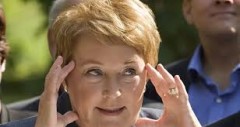In unveiling the Charter of Values recently, Quebec Premier Pauline Marois optimistically predicted that it would unite Quebeckers. Much to her distress, it has become a political football, a source of deep division in the province.
Judging by a Leger Marketing poll, the charter is supported by only a plurality of Quebeckers, 43% to 42%. Among anglophones, a mere 15% have come out in support of it. By contrast, 49% of francophones think it’s a good idea

The charter, due to be tabled in the National Assembly later this autumn, is controversial for two reasons. It would ban government employees from wearing “overt and conspicuous” religious symbols and head gear such as hijabs, yarmulkes, turbans and large crucifixes. It would also forbid them to cover their faces while providing state services.
Critics claim that the secular charter is steeped in xenophobia and at odds with the Canadian Charter of Rights and Freedoms, which enshrines freedom of religion.
Justin Trudeau, leader of the federal Liberal party, has accused the separatist Quebec government of playing “divisive identity politics.” Canadian Prime Minister Stephen Harper believes the charter in its present form will not be passed unless Quebec’s minority government garners the backing of one of the two opposition parties, which are none too keen about it.
Anglophone minorities in Quebec, including the Jewish community, have expressed doubts as well. The Quebec branch of the Center for Israel and Jewish Affairs, the successor organization of the Canadian Jewish Congress, has come out against it. Anita Bromberg, B’nai Brith’s director of legal affairs, has described it as a “constitutional breach.”
There is a valid argument to be made for the notion that government offices should be free of religious symbols and impart an atmosphere of neutrality in a completely secular setting, as the charter presumably intends.
But Canada, far from being a homogenious nation of anglophones or francophones, is instead a diverse rainbow of ethnicities and religious groups. Indeed, Canada is a model of multiculturalism as its best, at a time when sectarianism is tearing apart countries like Syria, Iraq and Egypt.
The charter, however, is a violation of Canada’s democratic spirit, and would be widely regarded as a mean-spirited and counter-productive measure likely to alienate considerable numbers of Quebeckers. This, then, is an issue that the people of Quebec should resolve democratically by means of a referendum or, as Quebec’s Liberal party leader, Philippe Couillard, has suggested, a general election.

In the meantime, the Quebec government can allay suspicions and fears of its motives and sincerity by rededicating itself to the otherwise worthy cause of secularism.
For starters, Premier Marois should take steps to remove the conspicuously large crucifix in the Quebec legislature. By the same token, Montreal’s city council should pass a motion to dispose of the giant crucifix on the summit of Mt. Royal.
Apart from being blatant throwbacks to Quebec’s clerical past, these overt religious symbols are the antithesis of secularism and mock the proposed Charter of Values.